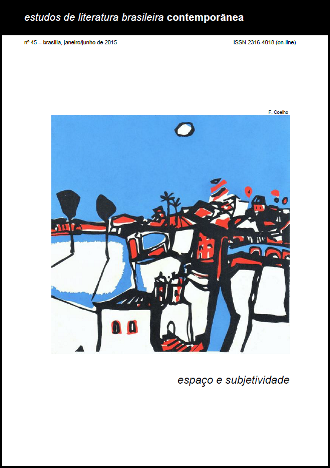Des-reterritorializações:
percursos possíveis do romance afro-brasileiro recente
DOI:
https://doi.org/10.1590/2316-4018451Abstract
Este estudo consiste em analisar, desde o conceito de multiterritorialidade, elaborado pelo geógrafo Rogério Haesbaert, alguns percursos diaspóricos das personagens do romance afro-brasileiro Um defeito de cor (2006), da escritora Ana Maria Gonçalves. Na narrativa, que se desenvolve na África e no Brasil do século XIX, daremos destaque à protagonista, Kehinde, em sua mobilidade material e simbólica pelos continentes africano e americano. Para Haesbaert, o aspecto imanente da multiterritorialização na vida dos indivíduos e dos diferentes grupos humanos tem sido desestimado pelo “mito” da desterritorialização. Em lugar de uma simplista desterritorialização desenraizadora, teríamos um permanente processo de reterritorialização, espacialmente descontínuo e sumamente complexo. Assim, é desde um mover-se como des-reterritorialização, por um lado, simbólica e cultural, e, por outro, política e econômica, que pensaremos esses percursos diaspóricos das personagens da obra.
Downloads
Downloads
Published
How to Cite
Issue
Section
License
Authors who publish in this journal agree to the following terms:
a) The authors maintain the copyright and grant the journal the right of first publication, the work being simultaneously licensed under the Creative Commons Attribution License-Non Commercial 4.0 which allows the sharing of the work with acknowledgment of the authorship of the work and publication this journal.
b) Authors are authorized to enter into additional contracts separately, for non-exclusive distribution of the version of the work published in this journal (eg publish in institutional repository or as a book chapter), with authorship recognition and publication in this journal.
c) Authors are allowed and encouraged to publish and distribute their work online (eg in institutional repositories or on their personal page) after the editorial process, as this can generate productive changes, as well as increase the impact and citation of published work (See The Effect of Free Access).
d) The authors of the approved works authorize the magazine to, after publication, transfer its content for reproduction in content crawlers, virtual libraries and the like.
e) The authors assume that the texts submitted to the publication are of their original creation, being fully responsible for their content in the event of possible opposition by third parties.


